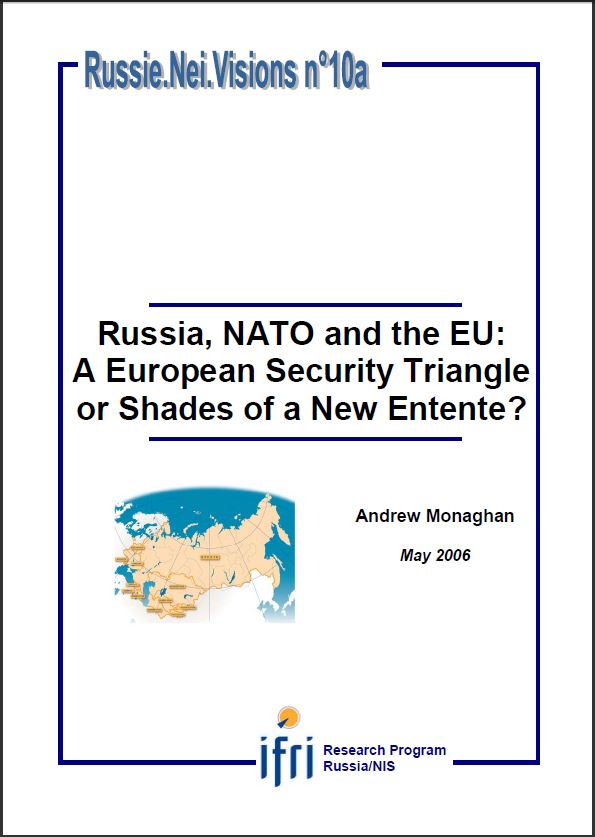Russia, NATO and the EU: A European Security Triangle or Shades of a New Entente?

The relationships between the EU, NATO and Russia are of great significance for all their actors and for regional security more broadly. The overlapping remit of each is complementary, and provides a potentially beneficial way to address current military and soft security concerns. And indeed good progress has been made —formal relationships have been established and there has been some practical cooperation in a number of areas. This progress is particularly impressive when considered in appropriate historical context— i.e. against the backdrop of East-West confrontation. Few would have foreseen such progress fifteen or even ten years ago. However, there is no 'triangle' —ambiguity and contradiction mar all the relationships, which are dogged by a number of conflicting interests. Moreover, although the top leadership of all three entities profess the desire to enhance the relationships, it is clear that a number of constituencies on all sides do not seek similar developments, for a number of reasons. This has slowed cooperation significantly. EU-NATO cooperation therefore remains problematic, and the West's relations with Russia are by no means past some 'point of no return', to the confrontation of the past half century.
Download the full analysis
This page contains only a summary of our work. If you would like to have access to all the information from our research on the subject, you can download the full version in PDF format.
Russia, NATO and the EU: A European Security Triangle or Shades of a New Entente?
Related centers and programs
Discover our other research centers and programsFind out more
Discover all our analysesRussia's Asia Strategy: Bolstering the Eagle's Eastern Wing
Among Russia’s strategic priorities, Asia traditionally played a secondary role compared to the West. In the mid-1990s, then Foreign Minister Yevgeny Primakov initiated a rapprochement with China and India. Then, in 2014, deteriorating relations between Russia and the West prompted Moscow to begin its “great pivot to the East”.
Kazakhstan After the Double Shock of 2022: Political, Economic and Military Consequences
The year 2022 represented a dual shock for Kazakhstan. In January, the country faced its most severe political crisis since independence, followed in February by Russia’s full-scale invasion of Ukraine, which cast uncertainty over the borders of post-Soviet states. These consecutive crises profoundly shaped Kazakhstan’s domestic and foreign policy.

How the Russian Army Changed its Concept of War, 1993-2022
The traditional and high-intensity war that has occurred in Ukraine since Russia decided to invade raises a key issue: did post-soviet Russian strategic thought really prepare Russia for waging this war?
Russia's Nuclear Deterrence Put to the Test by the War in Ukraine
From the outset of its “special military operation” (SVO) against Ukraine on February 24, 2022, Russia, which possesses one of the world’s largest nuclear arsenals, has adopted aggressive deterrence measures and a resolutely menacing rhetorical stance.










